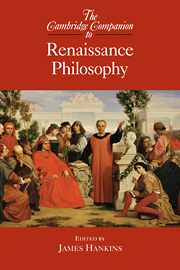Book contents
- Frontmatter
- 1 Introduction
- Part I Continuity and Revival
- Part II Toward Modern Philosophy
- 9 Nicholas of Cusa and modern philosophy
- 10 Lorenzo Valla and the rise of humanist dialectic
- 11 The immortality of the soul
- 12 Philosophy and the crisis of religion
- 13 Hispanic scholastic philosophy
- 14 New visions of the cosmos
- 15 Organizations of knowledge
- 16 Humanistic and scholastic ethics
- 17 The problem of the prince
- 18 The significance of Renaissance philosophy
- Appendix: Brief biographies of Renaissance philosophers
- Bibliography
- Index
12 - Philosophy and the crisis of religion
from Part II - Toward Modern Philosophy
Published online by Cambridge University Press: 28 November 2007
- Frontmatter
- 1 Introduction
- Part I Continuity and Revival
- Part II Toward Modern Philosophy
- 9 Nicholas of Cusa and modern philosophy
- 10 Lorenzo Valla and the rise of humanist dialectic
- 11 The immortality of the soul
- 12 Philosophy and the crisis of religion
- 13 Hispanic scholastic philosophy
- 14 New visions of the cosmos
- 15 Organizations of knowledge
- 16 Humanistic and scholastic ethics
- 17 The problem of the prince
- 18 The significance of Renaissance philosophy
- Appendix: Brief biographies of Renaissance philosophers
- Bibliography
- Index
Summary
Early in the evening of 17 April 1521, in the German town of Worms, Martin Luther appeared before the young emperor Charles V and assembled dignitaries of the Holy Roman Empire. Almost four years had elapsed since the defiant young monk had posted his ninety-five theses on the door of the Wittenberg Church and in the interval, to the consternation of the papal authorities, opinion in Germany had begun to swing decisively in favor of the reformer. The previous year had seen the promulgation of a papal bull formally excommunicating Luther, whose response had been to burn the document at the gates of Wittenberg. As a final attempt to head off the impending crisis, Charles V was persuaded to give Luther a hearing at the Imperial Diet, then meeting in Worms. On that first evening Luther was confronted with a pile of his publications and a hostile emperor who demanded that he acknowledge the writings and recant them. Luther asked for time to consider his position and appeared again the next evening before a large crowd. He delivered a long speech, making it clear that he had no intention of recanting:
Unless I am convinced by the testimony of the Holy Scriptures or by evident reason - for I can believe neither pope nor councils alone, as it is clear that they have erred repeatedly and contradicted themselves - I consider myself convicted by the testimony of Holy Scripture, which is my basis; my conscience is captive to the Word of God. Thus I cannot and will not recant, because acting against one’s conscience is neither safe nor sound. God help me. Amen.
- Type
- Chapter
- Information
- The Cambridge Companion to Renaissance Philosophy , pp. 234 - 249Publisher: Cambridge University PressPrint publication year: 2007
- 5
- Cited by

